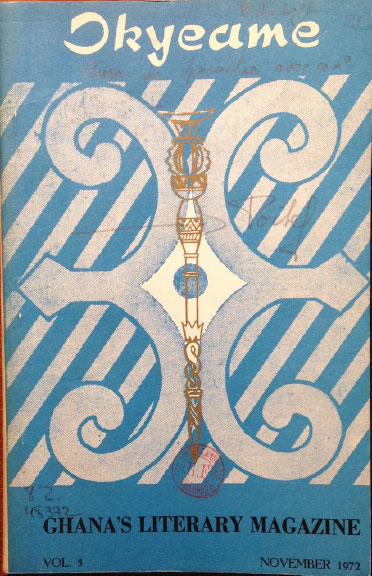Okyeame was a literary magazine founded by the Ghana Society of Writers in the post-Independence era. The first issue of Okyeame appeared in 1960, and issues were published, at irregular intervals, up until 1972. Okyeame took its name from a traditional Ghanaian figure, the “linguist” or “spokesperson” responsible for acting as a communicative intermediary between a chief and his people. Inspired by Kwame Nkrumah, the first Prime Minister of Ghana, the magazine sought to create a venue for exploring the African experience from a new creative and intellectual framework. Featuring works in translation and English, the magazine showcased “ [a]rticles calling for a Ghanaian poetry whose content and form was based on oral tradition, drum poetry” alongside “ traditional oral works translated by leading contemporary poets” of the period.[1] Likewise, the magazine dispersed Adinkra symbols on the covers and throughout the pages. For example, the image that accompanies this description appears to be a simplified variation of (dwennimmen), which literary translates as “ram’s horns” and symbolizes strength and humility. Nestled between the dwennimmen is an okyeamepoma (Linguist’s Staff), highlighting, once again, the magazine’s desired place as an intermediary for the people of 1960s-1970s Ghana and abroad Writers published in the magazine include acclaimed writers such Ama Ata Aidoo, Efua Sutherland, Ayi Kwei Armah, and the first editor, Kofi Awoonor.
These digitized archival materials will be accompanied by a digital exhibition, salon, and research and teaching aids on the Global Poetics Project website. This archive will be of particular interest to scholars researching post-colonial literature, little magazines, post-colonial publishing, print cultures of the Global South, African literature, theories on Black poetry and literary practices, texts of the Black diaspora, and the study of Black diasporic literature at the start of the decolonial moment.

